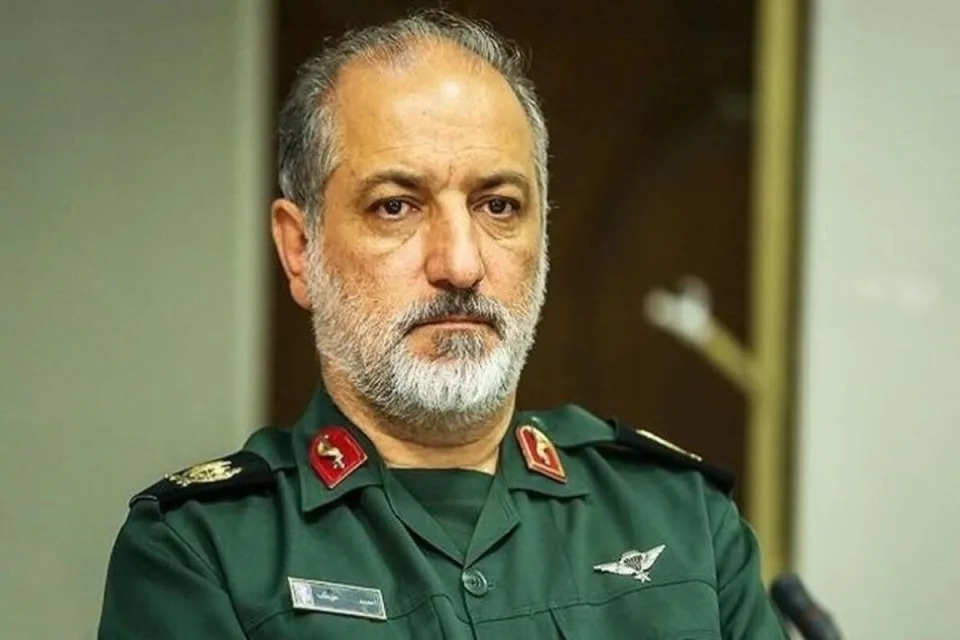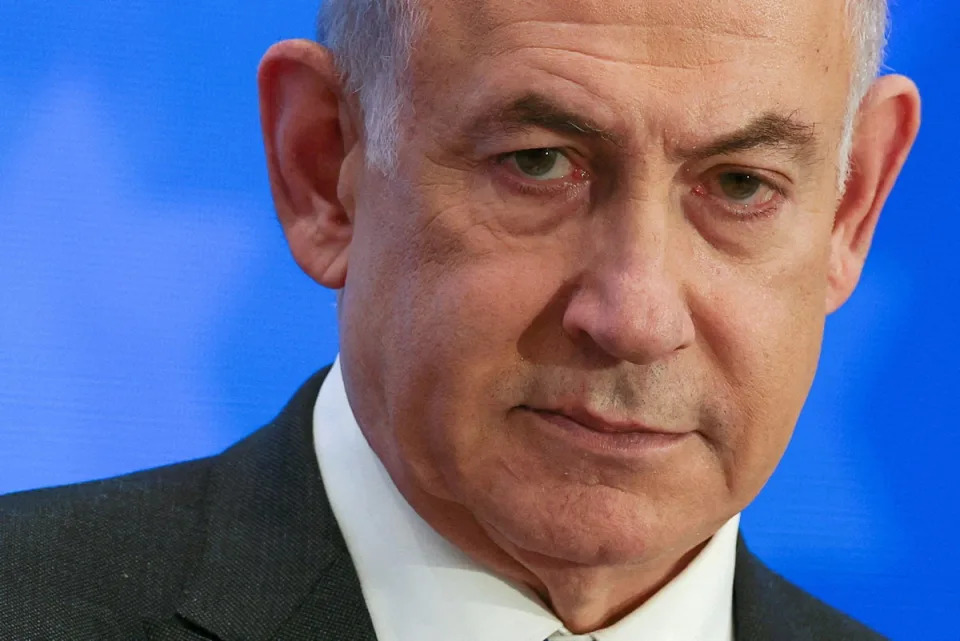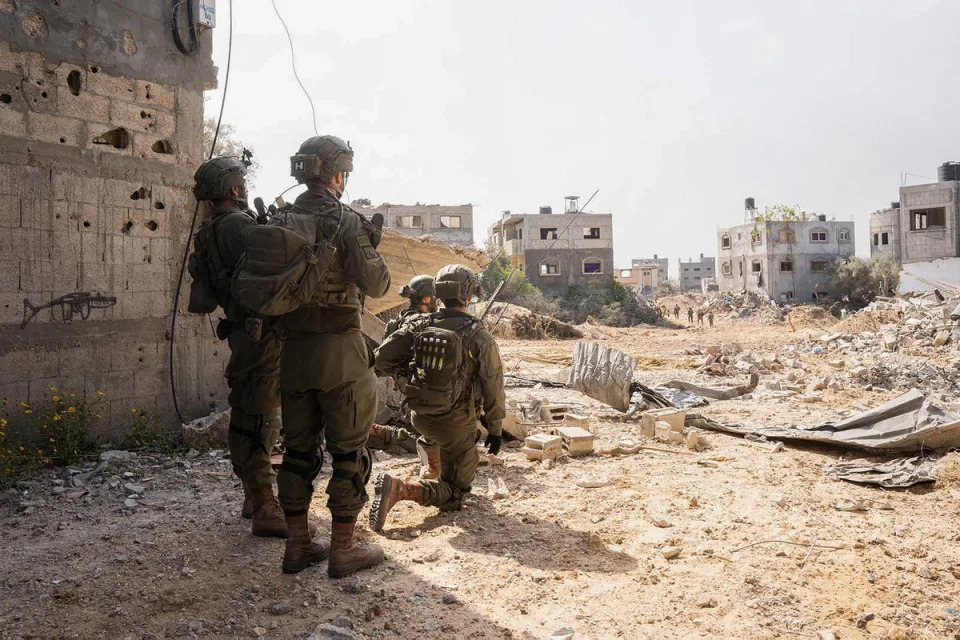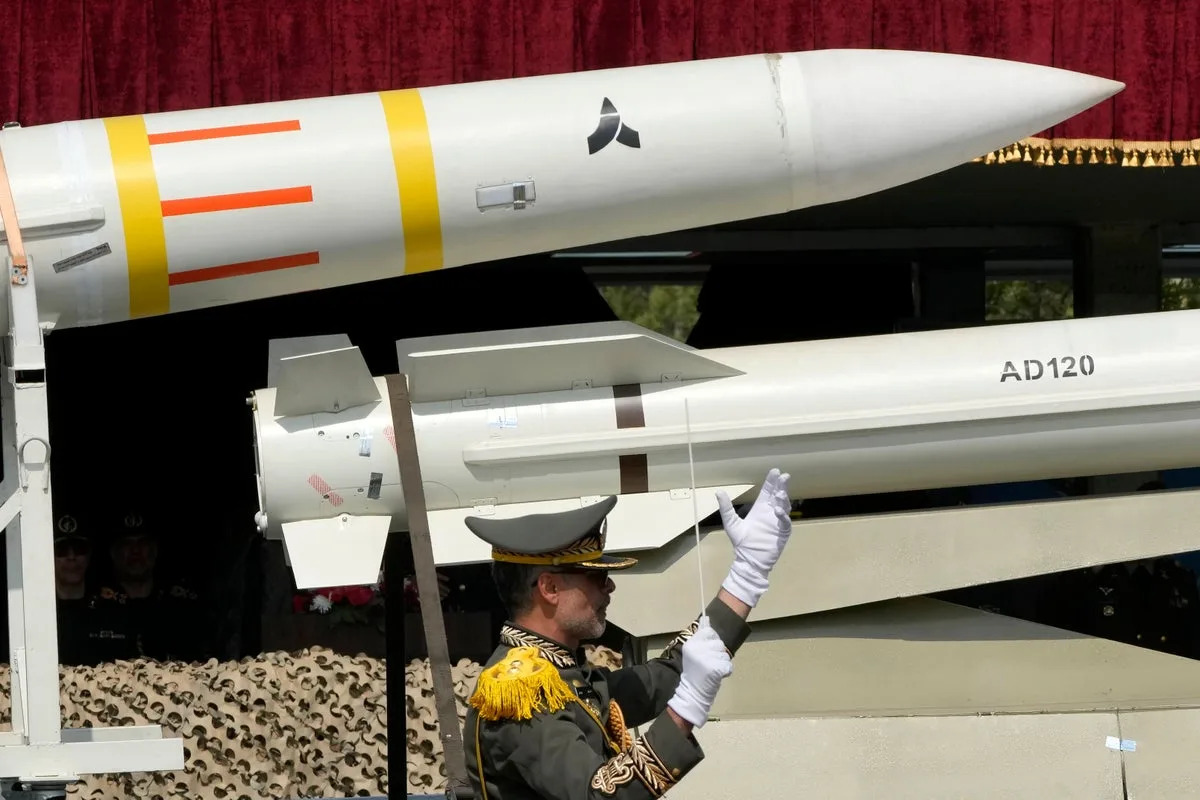Iran’s response if Israel takes any further military action against it would be “immediate and at a maximum level,” Foreign Minister Hossein Amir-Abdollahian told CNN Thursday, as fears rise of an escalation of the conflict in the Middle East.
“In case the Israeli regime embarks on adventurism again and takes action against the interests of Iran, the next response from us will be immediate and at a maximum level,” Amir-Abdollahian told CNN’s Erin Burnett in an exclusive interview in New York.
His remarks come in the wake of an unprecedented Iranian attack on Israel last week that Tehran said was retaliation for a deadly suspected Israeli airstrike on Iran’s consulate in Syria – placing the region on edge as Israel vowed to strike back in return.
Last Saturday, Iran launched hundreds of drones and missiles on Israel in response to the April 1 attack on its Damascus consulate that killed at least seven officials, including a top Iranian commander.
The Iranian attack on April 13 appeared designed to maximize spectacle while minimizing casualties, and Israel and its allies downed the vast bulk of the projectiles.
The tit-for-tat strikes have brought a decades long shadow war between Israel and Iran out in the open and sent fear coursing through the Middle East.
Israel’s allies, including the United States, have called for restraint from Israel in a bid to prevent strikes from escalating into a regional war, as Israel’s ongoing war against Palestinian militant group Hamas in Gaza sends tensions between it and its neighbors soaring.
It is unclear if Israel will listen to the calls of its allies.
Israeli Prime Minister Benjamin Netanyahu on Wednesday said Israel will make its “own decisions” when responding to Iran’s airstrikes.
Speaking from the Iranian Permanent Mission to the United Nations, Amir-Abdollahian said Iran sincerely hoped Israel would not repeat “the previous egregious error,” referencing the apparent Israeli strike in Damascus.
“If the Israeli regime commits the grave error once again our response will be decisive, definitive and regretful for them,” Amir-Abdollahian said, noting that this warning had been communicated to the White House via the Swiss Embassy in Tehran.
“We do not seek to create tension and crisis or increase such situations in the Middle East and we sincerely hope the Israeli regime does not repeat the previous egregious error,” he said.
Amir-Abdollahian also said he is hopeful potential Israeli actions could be stopped by the US and that the White House “will not give renewed permission for adventure-seeking” by Israel.
“We believe that America will calculate according to messages that were exchanged between us over the past six months,” he said.
Amir-Abdollahian also said the intent of the Iranian strike on Israel last weekend was ” to warn” and to “have taken equal action” and “to let it be known we do have the means to respond.”
He said the more than 300 missiles and drones fired by Iran on Saturday “stayed within a minimum of frameworks” and the action was “legitimate defense” in response to the suspected Israeli strike.
“Our operations in response were carried out at a minimum because we were not seeking to hit multiple targets,” he said.
Suspected Iran spy ship sails home as the world awaits a new Israeli attack
A suspected Iranian spy ship appears to be sailing home after nearly three years at sea — a move that comes as the world awaits Israel’s response to Tehran’s retaliatory attack.
The return of the MV Behshad, a cargo ship that U.S. analysts and officials suspect may have provided information and targeting assistance to Houthi rebels in the Red Sea, would remove one possible high-profile target for any Israeli strikes.
Iran has previously warned against targeting the ship, and in a sign of the heightened tensions over possible Israeli targets, a senior Iranian commander warned Thursday that the country could review its nuclear doctrine.
“If Israel wants to use the threat of attacking nuclear centers to put pressure on Iran, it is likely that the nuclear doctrine and policies of the Islamic Republic of Iran will be reviewed and the considerations announced previously will be canceled,” Ahmad Haghtalab, the IRGC commander in charge of nuclear security, was quoted as saying by the country’s semiofficial Tasnim news agency.
Sailing home
The Behshad crossed from the Arabian Gulf into the Persian Gulf early Thursday morning, and was due to arrive later in the evening at the port of Bandar Abbas on Iran’s southern coast, according to ship tracking website MarineTraffic.com. Data provided to the website via the automated identification system of the Behshad said that it had been at sea since June 18, 2021.
NBC News previously reported that the Behshad had spent a long time at sea, lingering in almost the same spot in the Red Sea between Yemen and Eritrea since January 2023. By Jan. 11 of this year, it had moved to near the entrance to the Red Sea, a choke point known as the Bab al-Mandeb strait — or “the Gate of Grief” — according to the ship tracker.
Later, in February, the Behshad traveled south into the Gulf of Aden and docked off the coast of a Chinese military base in Djibouti, east Africa. The Behshad could be seen there on ship tracking websites until the end of March, when it then disappeared from view. It did not reappear until early April, this time sailing close to the coast of Iran in the Gulf of Oman, before passing through the Strait of Hormuz on Wednesday, the ship tracking site showed.
The Iranian ship had provided electronic intelligence to the Yemen-based Houthis, enabling them to spot and target vessels in the Red Sea region, according to a U.S. official, a U.S. congressional aide with knowledge of the matter and a Middle Eastern official.
Analysis by NBC News and several other experts showed that the Behshad was several miles away as Houthi rebels carried out a number of attacks on commercial vessels that created ship diversions and delays in the global supply chain.
On April 7 Houthi leaders said they had targeted British and U.S. ships in the Red Sea, while in the Arabian Sea and Indian Ocean it had attacked two Israeli vessels heading to port in Israel.
The Iranian military warned against any strikes on the Behshad in a video posted to Telegram in February, with a narrator describing the ship as a “floating armory,” and saying that any aggression towards the ship would “jeopardize international maritime routes [and] security.”
The Behshad’s return home comes as Israel weighs how to respond to Iran’s launching of more than 300 drones and missiles at the country over the weekend, which Tehran said was in response to the April 1 bombing of an Iranian consular building in Damascus that killed two generals and five officers in the Iranian Revolutionary Guard Corps.
The U.S. and its allies have been urging Israel not to escalate further, hoping to avoid all-out war in the region. If Israel does respond militarily, it could target Iran itself or choose a less direct option that may prevent the situation from spiraling.
“The ship is likely viewed as one of the targets Israel may hit in the future,” said Michael Horowitz, the head of intelligence at Le Beck International, a security and risk management consultancy, in a post on X.
The Behshad has been on its current deployment since 2021, replacing the MV Saviz, another cargo ship suspected of being used by the IRGC and which was anchored for years off the coast of Yemen before it was damaged in an attack Iran alleged was carried out by Israel.
Iran makes first nuclear threat over possible Israeli attack as US and UK slap fresh sanctions on Tehran
A senior Iranian commander has issued Tehran’s first nuclear threat since it launched a missile and drone attack against Israel as it looks to warn off a retaliatory assault.
Israel has yet to decide - or at least announce publicly - how to respond to the Iranian attack last weekend, which saw Tehran fire more than 300 missiles and drones at Israel.
But several members of its five-person war cabinet have alluded to military retaliation despite calls from Israel’s western partners to act with both their head and their heart.
On Thursday, senior Iranian Revolutionary Guards commander Ahmad Haghtalab warned that Israel’s recent threats to respond “make it possible to review our nuclear doctrine and deviate from our previous considerations”.
He added that if Israel was to attack its nuclear centres, “we will surely reciprocate with advanced missiles against their own nuclear sites”.
It is the first time Iran has explicitly referenced its suspected nuclear weapons programme since it launched its attack against Israel.

And it comes a day after Iran’s president Ebrahim Raisi warned that even the “tiniest” invasion of its territory would bring a “massive and harsh” response.
Experts have warned that since Donald Trump abandoned a nuclear pact between Iran and the US, Tehran has become capable of building a nuclear bomb in six months to a year.
While one senior US official told ABC News that Israel was likely to hold off its response to the Iranian attack until after Passover, the major Jewish holiday that lasts from Monday to 30 April, top Israeli officials remain tight-lipped about their intentions.
Israeli prime minister Benjamin Netanyahu, following a meeting with UK foreign secretary David Cameron on Wednesday, said it was his country, and his alone, that would be the one to decide whether and how to respond.
Brigadier-General Doron Gavish, head of Israel’s air defence task force, meanwhile, said Israel has been working overtime to rebuild its stockpiles in preparation for another possible attack from Iran or its proxies.

It comes as the US and UK launched sweeping sanctions against Iran and its military arm, the Islamic Revolutionary Guard Corps (IRGC), heeding calls from Israeli officials to carry out a “diplomatic attack” in response to Tehran’s assault.
The US announced new sanctions on Iran targeting its unarmed aerial vehicle (UAV) production. The Treasury Department said the measures targeted 16 individuals and two entities enabling Iran’s UAV production, including engine types that power Iran’s Shahed variant UAVs, which were used in the 13 April attack.
US president Joe Biden said the sanctions showed the US were committed to Israel’s security and would continue to hold Iran accountable.
“Let it be clear to all those who enable or support Iran’s attacks: The United States is committed to Israel’s security,” he said.
“We are committed to the security of our personnel and partners in the region. And we will not hesitate to take all necessary action to hold you accountable.”
Britain placed sanctions on Iranian military entities, including the General Staff of the Armed Forces and the Islamic Revolutionary Guard Corps (IRGC) Navy, according to an official notice. The British sanctions target 13 entities or individuals in total, the notice showed.

It followed announcements from the European Union (EU) to step up sanctions against Iran. The decision was made after the EU’s first summit with all 27 national leaders since the Iranian attack last Saturday
“We feel it’s very important to do everything to isolate Iran,” said Charles Michel, president of the European Council and chair of the summit.
He said that the new sanctions against Tehran would target companies involved in the production of drones and missiles.
Regarding the ongoing war in Gaza, a conflict at the heart of the wider tensions in the Middle East, senior US officials are set to hold a virtual meeting with their Israeli counterparts to discuss Israel’s plans for the southern Gaza city of Rafah as Washington seeks alternatives to an Israeli offensive. The meeting is a follow-up to a similar meeting held on 1 April.
Mr Biden has urged Israel not to conduct a large-scale offensive in Rafah to avoid more Palestinian civilian casualties in Gaza, where Palestinian health authorities say more at least 33,970 Palestinians have been killed and 76,770 wounded since 7 October, when Hamas launched its attack on Israeli soil.
Hundreds of thousands of displaced Palestinians are currently residing in Rafah with nowhere to go. Swathes of the Gaza Strip have been completely destroyed.
Jordan walks a tightrope after downing Iranian drones and missiles
As the skies over Amman and other Jordanian cities lit up with Jordan’s interception of Iranian drones and missiles headed for Israel last weekend, officials in the country were notably silent for hours.
Tehran’s unprecedented attack on Israel in retaliation for a suspected April 1 Israeli assault on its diplomatic building in Damascus has put the kingdom in an uneasy and dangerous position.
Jordan’s geography demonstrates its quandary. The small kingdom sits between Israel and the West Bank on one side, and Iran’s neighbor Iraq on the other, where pro-Iran militias reign supreme. To its north lies Syria, a failing state that is also in Iran’s orbit.
Last week’s attack was the first time in more than three decades that missiles directed at Israel entered Jordanian airspace, when Saddam Hussein launched Scud missiles at the Jewish state in 1991 during the Gulf War.
But much has changed since then. Jordan became the second Arab country to sign a peace deal with Israel in 1994. In the eyes of Israel’s Western allies, it has been vital to regional security. It has close intelligence and security cooperation with Israel, hosts American troops and is reliant on United States military aid.
The Jordanian-Israeli peace treaty had always been unpopular at home, but it has come under increased stress of late. Emotions have been running high in Jordan over the war in Gaza, where more than 34,000 Palestinians have been killed as Israel pummels the territory. More than half of Jordan’s population is either Palestinian or of Palestinian descent, and for months its leadership has been walking a tightrope trying to balance mounting public anger with its close alliance with the United States and relationship with Israel.
In the early hours of Sunday, Jordanians took to social media to post videos of interceptions and projectile fragments that landed in some parts of the country. “It was scary… you could hear the explosions echo (across the area),” one Amman resident told CNN.
The only official announcement related to the events that night came hours before the attack from the country’s civil aviation agency, announcing the closure of the kingdom’s airspace for traffic.
The optics weren’t good.
It didn’t take long that night for social media to get flooded with posts criticizing Jordan and its leadership for the interceptions. The kingdom was portrayed as shielding Israel at a time when Palestinians were being bombed by Israel in Gaza. One meme shared by users apparently outside Jordan showed a manipulated image of Jordan’s King Abdullah in an Israeli military uniform.
Officials were likely scrambling behind the scenes to explain the events to their people.
On Sunday the government confirmed the interceptions “to protect citizens and residential areas.” Prime Minister Bisher al-Khasawneh, speaking during a cabinet meeting, warned against the “spread of rumors or misleading news that could fuel anxiety and fear.”
But it did little to ease concerns among many in the kingdom that trouble may still be ahead. After Tehran completed its attack against Israel, it turned its focus on Jordan.
“The military forces of our country are carefully monitoring the movements of Jordan during the punitive attack of the Zionist regime (Israel), and if they participate in a possible action, they will be the next target,” an unidentified source in the Islamic Republic’s armed forces told the semi-official Fars news agency.
Within hours, Jordan summoned the Iranian ambassador in Amman to protest what it said was “harmful disinformation.” Jordanian Foreign Minister Ayman Safadi told CNN’s Becky Anderson on Monday that Amman will “retaliate” against Iran if such “disinformation” continues, adding that his country faces longstanding threats from Iranian-backed groups accused of smuggling drugs and weapons.
Tough balancing act
US and Israeli officials sought to play up the role of Arab states in thwarting Iran’s attack. But Jordan pushed a different narrative.
“What we did was consistent with our long-standing policy and any projectiles, drones, whatever that enters our space” Safadi said. “We are in the range of fire and any missiles or projectile that could fall in Jordan would cause harm to Jordan. So, we did what we have to do. And let me be very clear: We will do the same regardless of where those drones are from. From Israel, from Iran, from anybody else. Our priority is to protect Jordan and to protect Jordanian citizens.”
And Jordan’s leadership seems intent on sending that message to its people. Fighter jets have been patroling its skies since Monday. The military says it has increased air sorties to prevent any violations of its airspace and to protect the country.
“Jordan will not be a battlefield for any party, and the protection of Jordanians comes above all else” King Abdullah told local leaders in a visit to the northern governorate of Mafraq on Tuesday.
The country’s message to the international community and its allies this week has been that the focus should return to Gaza and the suffering of Palestinians there. Ending the war in Gaza is the only way to deescalate regional tensions, is the message that King Abdullah gave to US President Joe Biden in a call on Sunday, according to the Jordanian Royal Court.
In the CNN interview, Safadi accused Israeli Prime Minister Benjamin Netanyaahu of “invoking a fight with Iran” to “dilute” the international pressure on Israel over Gaza.
The Jordanian monarch has faced a tough balancing act since October as anger over the mounting death toll in Gaza has driven thousands to the streets.
Abdullah and his wife Queen Rania, who is of Palestinian descent, have been among the loudest and most critical voices of Israel and its devastating war in Gaza. The kingdom has also been at the forefront of the effort to deliver humanitarian aid into the enclave, turning its military airport into a hub for international airdrops and carrying out dozens of such missions.
But for many in Jordan that has not been enough. Protesters since October have urged the kingdom to do more, with pressure growing on it to cut ties with Israel and shut its embassy in Amman, the scene of many protests over the past six months.
It is no secret that Jordan’s relationship with Israel under Netanyahu’s leadership has been strained for years, but is now perhaps at its lowest in decades. Those frustrations were laid bare by Safadi, Jordan’s foreign minister, who ruled out breaking relations, but said the Jordan-Israel peace treaty is now “a document collecting dust.”
As Israel weighs how to respond to Iran’s attack, the region sits on a knife’s edge with the very real threat of an all-out war in the Middle East. And the stakes could not be higher for Jordan, a key Western ally that has prided itself as a bedrock of stability in a turbulent region.
Why Jordan helped repel the Iranian missile attack on Israel
If anyone thought Jordan’s part in intercepting drones Iran launched at Israel on the weekend marked a turning point in the Hashemite Kingdom’s relations with the Jewish state, Jordanian Foreign Minister Ayman Safadi immediately tried to dispel that notion, insisting in media interviews that Israel was still the real problem.
Leading figures in Jordan have for months been leveling harsh criticism on Israel and Amman called off an energy and water deal in response to the war in Gaza, amid pressure from a population that has largely been unsupportive of relations between the countries since they signed an agreement in 1994.
But the Iranian assault, with projectiles flying over Jordanian territory, marked a point where Amman was working in its own interest, which overlapped with Jerusalem’s, rather than Jordan jumping to Israel’s rescue, experts said.
Iran has long worked to gain a foothold in Jordan and undermine the stability of its monarchy. Israel’s 300 km-border with Jordan is its longest frontier, such that a stronger Iranian or Iran-backed presence would pose a serious threat to the Jewish state.
Yet Israel, Eyal Pinko, senior research fellow at Bar-Ilan Universitys BESA Center of Strategic Studies said, is “only one player on the chessboard…in the war within Islam, between the Shi’ite countries led by Iran and the Sunni countries, such as Egypt, Saudi Arabia, Bahrain, the UAE, Jordan and Morocco.”
Former Deputy Ambassador to Egypt Ruth Wasserman Lande, a fellow at the Misgav Institute for National Security, told Jewish Insider that in recent years Iran “found graves of all kinds of Shi’ite sheikhs on the Israel-Jordan border, told the Jordanians they must come and take care of the graves, and suddenly there was an Iranian presence in Jordan.”
Those graves began a “slow encroachment” that characterizes Iran’s behavior around the region, Wasserman Lande said. Jordan remained silent for years, even when Iran-supported Hamas tried to compete with the Kingdom over primacy at holy sites in Jerusalem, and as Iran and its proxy Hezbollah smuggled weapons and drugs through Jordan.
Iran has been trying to shuffle the cards inside Jordan by inciting Palestinians in Jordan via social media, Pinko noted in a briefing to the Jerusalem Press Club this week.
Hussain Abdul-Hussain, a research fellow at the Foundation for Defense of Democracies, told JI that “this is about Jordan itself before it’s about Israel. The sovereignty of Jordan is at stake…Jordan is aware their sovereignty is really precious. This means any kind of infringement on their sovereignty, big or small, will be foughtThis happens to align with Israeli interests.”
Hussain Abdul-Hussain, a research fellow at the Foundation for Defense of Democracies, told JI that Iran would like to replace [Jordans monarchy] with any of their proxies or create a proxy inside Jordan.”
A week before the missile and drone attack on Israel, Iranian media reported that Hezbollah is ready to arm 12,000 Islamist resistance fighters in Jordan to overthrow the monarchy.
“Jordan only recently started saying ‘enough’ in public,” Wasserman Lande said. “Apparently, they’ve reached a red line and made clear statements that they want this to stop.”
As such, “this is about Jordan itself before it’s about Israel,” Abdul-Hussein said. “The sovereignty of Jordan is at stake…Jordan is aware their sovereignty is really precious. This means any kind of infringement on their sovereignty, big or small, will be foughtThis happens to align with Israeli interests.”
As such, the palaces readout of the kings call with President Joe Biden on Sunday said that His Majesty affirmed that Jordan will not allow for a regional war to unfold on its land. The statement made no reference to Iran or intercepting the projectiles it launched, but said the call “covered the latest developments in the region and efforts to de-escalate and reach a ceasefire in Gaza.”
Safadi told CNN: “Whatever objects that go into our skies, violate our airspace, that we believe pose a danger to Jordan, we will do whatever within our means to end that threat and that’s what we did… Our priority is to protect Jordan and Jordanian citizens.
Rather than pin the issue on Iran, Safadi said that the cause of all this tensionis the Israeli aggression of Gaza and the continued absence of a political horizon.
Abdul-Hussein called Safadis remarks horrible and said they didnt even add up.
He said the Iranian attack happened because theres no political horizon in Palestine — thats really dumb, because now hes putting Jordan in the way of a political horizon in Palestine, Abdul-Hussein said. If you think the absence of a political horizon justifies the Iranian attack, then why stand against it?
These kinds of statements are divorced from actual policies, Abdul-Hussein added.
Safadi can’t admit to cooperation with Israel, because of “anger on the street,” where most of the Jordanian population identifies as Palestinian, and “terrible incitement in education in Jordan,” Wasserman Lande said.
Even though the king talks about east Jerusalem and Gaza in the media, Pinko said, he is afraid of what is happening inside his country. But you only see that below the [surface].
Former Deputy Ambassador to Egypt Ruth Wasserman Lande, a fellow at the Misgav Institute for National Security, saw Jordan’s part in thwarting the Iranian attack as “a turning point in [Israel and Jordan’s] cooperation against Iran, because the [Jordanian] government is at a boiling point when it comes to its own survival,” which she said “depends on other countries, first and foremost Israel and the U.S.”
Jordan also faced harsh criticism beyond its own borders, as well, with one Al Jazeera executive writing: There are Arab citizens who pull the trigger to protect Israel and watch when the Palestinians are bombed. A new and shocking scene. One meme that made the rounds on X, formerly Twitter, showed King Abdullah II in an IDF generals uniform.
An Israeli official, speaking on the condition of anonymity, said that Jerusalem was very encouraged by Amman being part of the coalition against Iran, and an effective one at that.
However, the official said, Israel has kept quiet about it because of the intense pressures the monarchy is facing.
Wasserman Lande saw Jordan’s part in thwarting the Iranian attack as “a turning point in [Israel and Jordan’s] cooperation against Iran, because the [Jordanian] government is at a boiling point when it comes to its own survival,” which she said “depends on other countries, first and foremost Israel and the U.S.”
Pinko said that cooperation between Israel and Jordan in the military and intelligence spheres is “very strong,” but posited that Washington pressured King Abdullah to help Israel in this case, noting that “Jordan pretty much depends on the U.S. and most of the Jordanian military equipment and platforms are Americans.”




